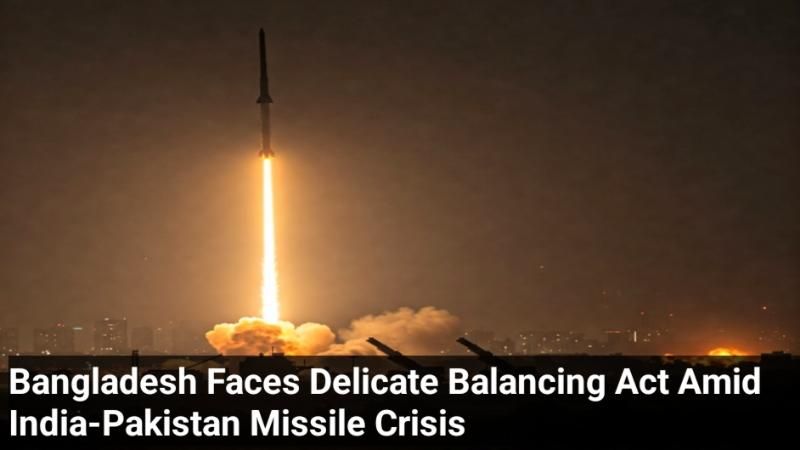The escalating tensions between India and Pakistan, marked by India's recent missile strikes into Pakistani territory, have placed Bangladesh in a precarious and delicate position within the South Asian geopolitical landscape. Historically bound to both nations through complex threads of culture, economics, and the shared experience of the 1971 Liberation War, Bangladesh now faces the challenge of navigating a path that safeguards its own interests while regional stability hangs in the balance.
The immediate impact on Bangladesh is likely to be felt most acutely in the realm of diplomacy and regional relations. As a neighbor to both India and Pakistan, Bangladesh has always advocated for peaceful dialogue and cooperation. This sudden and aggressive action could strain these relationships, potentially hindering existing collaborations within SAARC (South Asian Association for Regional Cooperation) and other regional forums. Bangladesh, currently led by an interim government, will be under immense pressure to articulate a stance that promotes de-escalation without alienating either powerful neighbor.
Economically, an extended conflict between India and Pakistan could have ripple effects across South Asia. Trade routes, supply chains, and regional investment could be disrupted, impacting Bangladesh's own economic growth and stability. Furthermore, any mass displacement of populations in the affected areas could create humanitarian challenges that might indirectly affect neighboring countries.
An India-Pakistan conflict could have several adverse economic impacts on Bangladesh:
Trade Disruptions: The conflict could disrupt regional trade routes and supply chains, affecting Bangladesh's import and export activities. This could lead to increased costs and delays, impacting various sectors of the Bangladeshi economy.
Reduced Regional Investment: Instability in the region could deter foreign investment, affecting Bangladesh's economic growth and development projects. Investors may become hesitant to engage in business activities in a volatile environment.
Increased Vulnerability: As an import-dependent economy, Bangladesh could be particularly vulnerable to price fluctuations and shortages of essential goods if the conflict disrupts regional or global trade flows. This could lead to inflationary pressures and economic hardship.
Connectivity Projects: Bangladesh has been actively involved in initiatives to enhance regional connectivity with both India and other countries. A conflict could jeopardize these projects, hindering economic integration and potential benefits.
What Could Be Done by Bangladesh Now:
Given the gravity of the situation, Bangladesh has several potential avenues to pursue:
Strong Call for De-escalation: The interim government could issue a firm statement urging both India and Pakistan to exercise restraint and prioritize diplomatic channels to resolve their differences.
Offer of Mediation: Bangladesh, given its historically neutral stance in Indo-Pakistani conflicts, could cautiously offer its good offices to facilitate dialogue between the two nations, potentially within a regional framework like SAARC.
Emphasis on Regional Stability: Bangladesh can actively work with other SAARC members to collectively appeal for peace and stability in the region, highlighting the detrimental impact of conflict on the entire South Asian community.
Strengthening Diplomatic Ties: Maintaining open and consistent communication with both New Delhi and Islamabad will be crucial to understanding the evolving situation and conveying Bangladesh's concerns and desire for peace.
Focus on Internal Stability: The interim government should prioritize maintaining internal stability and social harmony within Bangladesh, ensuring that any external tensions do not lead to divisions within the country.
Anxiety of the British Bangladeshi Community:The news of escalating tensions between India and Pakistan will undoubtedly be a source of significant anxiety for the British Bangladeshi community in the UK. While geographically distant, the historical and cultural links many Bangladeshis share with the broader South Asian region create a sense of concern for the safety and well-being of people in the affected areas. Furthermore, any conflict in the subcontinent can unfortunately lead to heightened community tensions within the UK, potentially straining the generally positive inter-community relations. British Bangladeshis will likely be hoping for a swift de-escalation and a peaceful resolution to prevent further conflict and ensure stability in a region with which they share deep historical ties. Community leaders will likely play a crucial role in urging calm and promoting unity within the diaspora during this sensitive time.








.svg)


